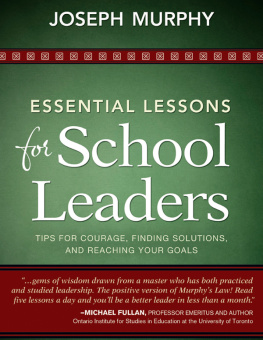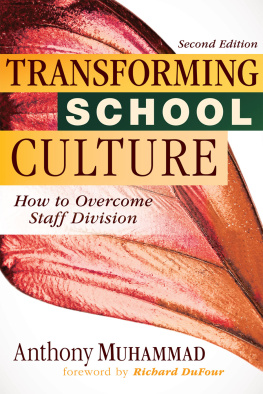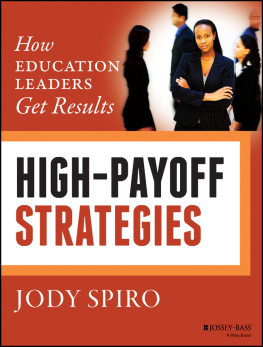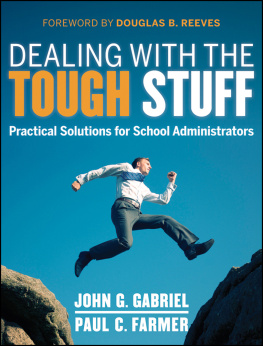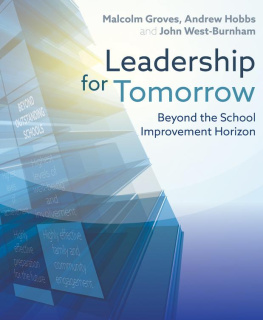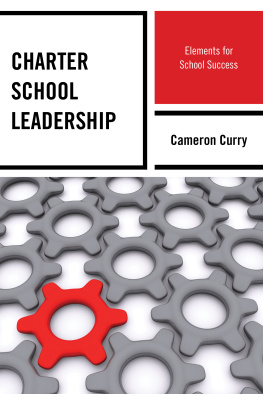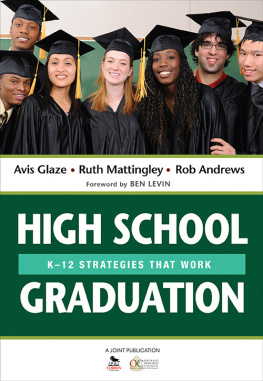This book is dedicated to everyone with
whom I have worked throughout
my career who has helped
me learn these lessons
Copyright 2011 by Corwin
First Skyhorse edition 2014
All Rights Reserved. No part of this book may be reproduced in any manner without the express written consent of the publisher, except in the case of brief excerpts in critical reviews or articles. All inquiries should be addressed to Skyhorse Publishing, 307 West 36th Street, 11th Floor, New York, NY 10018.
Skyhorse Publishing books may be purchased in bulk at special discounts for sales promotion, corporate gifts, fund-raising, or educational purposes. Special editions can also be created to specifications. For details, contact the Special Sales Department, Skyhorse Publishing, 307 West 36th Street, 11th Floor, New York, NY 10018 or .
Skyhorse and Skyhorse Publishing are registered trademarks of Skyhorse Publishing, Inc., a Delaware corporation.
www.skyhorsepublishing.com
10 9 8 7 6 5 4 3 2 1
Library of Congress Cataloging-in-Publication Data is available on file.
ISBN: 978-1-62873-754-7
E-book ISBN: 978-1-62914-123-7
Printed in China
About the Author


Joseph Murphy is the Frank W. Mayborn
Chair and associate dean at Vanderbilts Peabody College of Education. He has also been a faculty member at the University of Illinois and The Ohio State University, where he was the William Ray Flesher Professor of Education.
In public schools, he has served as an administrator at the school, district, and state levels. His most recent appointment was as the founding president of the Ohio Principals Leadership Academy. At the university level, he has served as department chair and associate dean.
He is past vice president of the American Educational Research Association (AERA) and was the founding chair of the Interstate School Leaders Licensure Consortium (ISLLC). He is coeditor of the AERA Handbook on Educational Administration (1999) and editor of the National Society for the Study of Education (NSSE) yearbook, The Educational Leadership Challenge (2002).
His work is in the area of school improvement, with special emphasis on leadership and policy. He has authored or coauthored nineteen books in this area and edited another twelve. His most recent authored volumes include Understanding and Assessing the Charter School Movement (2002), Leadership for Literacy: Research-Based Practice, PreK3 (2003), Connecting Teacher Leadership and School Improvement (2005), Preparing School Leaders: Defining a Research and Action Agenda (2006), Turning Around Failing Schools: Leadership Lessons from the Organizational Sciences (2008), The Educators Handbook for Understanding and Closing Achievement Gaps (2010), and Homelessness Comes to School (2011).
YOU ONLY GET ONE HAND TO COUNT WITH
Educators are adept at expansion. If we can find 5 ideas, we can quickly turn them into 50 and then 500. Before long, we have shelves of binders. The problem is that no one is going to hang on to these lists. And even when a miracle occurs and someone does, no one is around to inform her or him what is really important. No one is going to pursue 16 goals or a dozen professional development ideas. No one is going to believe that 20 dimensions of anything require action. Become fluent with the one-hand rule. If you only get two fingers to count, what is importantfor goals, areas of work, valued outcomes, and so forth? If you have four fingers, what makes the cut? If you start counting on your second hand, you may be in trouble. If you have to take your shoe off to count, it is likely that you have lost everyone.
LEAVE YOUR EGO IN THE CAR
Good leadership is not about you. It is about what you leave behind. When leaders with big egos leave, improvement often walks out the door with them. Good leadership does not depend on personality, certainly not on the big personality in the school.
HAVE THE COURAGE TO ADDRESS PROBLEMS DIRECTLY
I once had a colleague who told me about a problem that was vexing him at his schoola certain fifth-grade teacher who arrived to school late on a not infrequent basis. At our next meeting, I asked him if he had gained any traction on his problem. He replied that he had. In response to my inquiry, he informed me that he had sent a memo to all teachers about district policy about when teachers were to be at school and in their rooms at the start of the school day. What he told me was this: Rather than having the courage to talk to this single teacher whose behavior was inappropriate, he angered the entire rest of the faculty who were already doing the right thing. Not a wise piece of leadership.
TALK LESS
Most leaders talk too much in public meetingsand in private exchanges for that matter too. It is a bad habit that routinely dampens conversation and debate. Practice not saying anything for the first third of meetings. Pick your points of entry carefully.
MOST BARRIERS ARE SURMOUNTABLE
In the process of improvement, it is almost inevitable that significant barriers will arise. Ninety-five percent of us arrive at these seemingly insurmountable difficulties, acknowledge the impossibility of further movement, and turn back. Great leaders learn to dig trenches under barriers and find ladders to use to climb over them.
STRUCTURAL CHANGES DO NOT PREDICT SUCCESS
Principals and other school leaders are trained to solve problems and improve schools by identifying and importing structural changes to their schoolsblock schedules, ungraded classes, detracking, and so forth. This is problematic. The first iron law of school improvement is that structural changes never have predicted, do not now predict, and never will predict organizational success.
IT REALLY IS ALL ABOUT THE KIDS
It may seem trite to say it, but this lesson is often honored more in the breach than in practice. Keeping kids first does not negate the significance of othersbut it does put things in the right order.

This book captures all the lessons I have learned about educational leadership over the years in a simple and clear way. I have a principal on an improvement plan now, and it could have been written from this book. This truly helps me know I am on the right track.
Christopher Shaffer, Director, High School Campus Springfield High School, OH
LET OTHERS WIN
Leaders often develop the bad habit of assuming that they need to win every skirmish, debate, point of contention, and so forthwhat we call the Ty Cobb syndrome. It is not necessary and is generally tiresome. Get into the habit of letting others win.
UNDERSTAND FIRST, THEN JUDGE
Because they are generally in a hurry, leaders often judge before understanding situations. Snap assessments and quick judgments are part of the culture. It is always best to understand first.
LISTENLET PEOPLE FINISH TALKING
Teachers, students, and parents often have a chance to talk with the principal. Many will also tell you that they were not heard. Take the time to listen to what is being presented. Avoid jumping in with your answers until you take the time to reflect on what each person is telling you.

